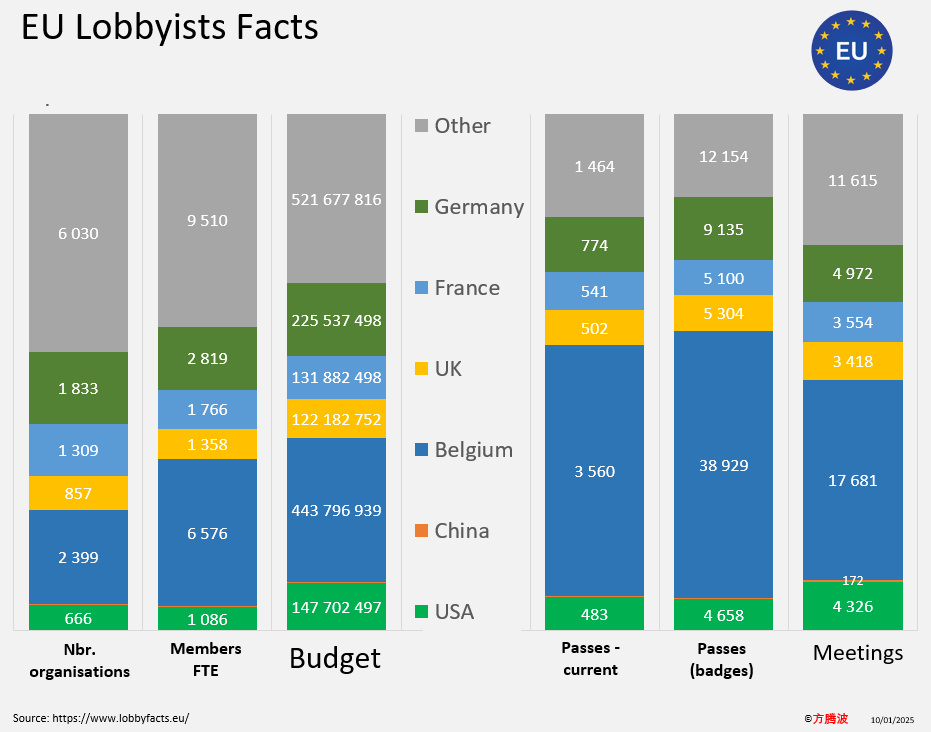Views: 165
A Critical Examination of Influence and Imbalance
Frans Vandenbosch 方腾波 12.01.2025

The European Union (EU) is often heralded as a bastion of democracy, transparency, and fair governance. However, beneath this veneer lies a complex and often opaque system of lobbying that has significant implications for the integrity of EU decision-making. This article critically examines the lobbying activities in Brussels, with a particular focus on the disproportionate influence wielded by the United States compared to other nations, such as China. The data, sourced from LobbyFacts.eu,[i] reveals a staggering imbalance in lobbying efforts, raising serious concerns about the fairness and transparency of the EU’s legislative processes.
The Scale of Lobbying in Brussels
Lobbying in Brussels is a multi-billion-euro industry, with over 13,102 organisations registered as lobbyists, employing 23,133 full-time equivalent (FTE) staff (where one FTE represents one person working full-time) and spending a combined total of €1.595 billion annually. These figures, drawn from LobbyFacts.eu, highlight the immense resources devoted to influencing EU policymaking. However, the distribution of lobbying power is far from equitable, with certain nations and corporations dominating the landscape. [ii]
The Belgian Connection: A Gateway for Foreign Influence
One of the most striking aspects of lobbying in Brussels is the disproportionate number of European Parliament (EP) passes held by Belgian citizens. According to LobbyFacts.eu, 3,560 out of 75,375 EP passes (as of 6 January 2025) are held by Belgians, many of whom work for foreign organisations. This phenomenon underscores the extent to which foreign entities have embedded themselves within the EU’s decision-making apparatus. While this is not inherently problematic, it raises questions about the potential for conflicts of interest and the extent to which these individuals may prioritise the interests of their employers over those of the EU citizens they ostensibly serve.
China’s Limited Footprint
In contrast to the overwhelming presence of US(United States) lobbyists, China’s lobbying efforts in Brussels are relatively modest. According to LobbyFacts.eu, there are only eight Chinese organisations with registered lobbyists in Brussels, employing 19 FTE staff and spending a total of €2.71 million annually. These organisations include prominent companies such as Huawei Technologies, Lenovo Group Ltd., and Ant Group, as well as trade associations like the European Union Chamber of Commerce in China[iii] and the China Council for the Promotion of International Trade.
The limited number of Chinese lobbyists suggests that China’s influence in Brussels is significantly less than that of the United States. It highlights the stark disparity in resources and influence between the two nations. The relatively small number of Chinese lobbyists also raises questions about the weak extent to which China’s interests are represented in EU policymaking, particularly in areas such as trade, technology, and climate change.[iv]
The Overwhelming Presence of US Lobbyists
The United States, by contrast, has a formidable presence in Brussels, with 666 organisations registered as lobbyists, employing 1,086 FTE staff and spending a total of €147.7 million annually. This figure is more than 80 times the number of Chinese lobbyists, underscoring the extent to which US interests dominate the lobbying landscape. The sheer scale of US lobbying efforts is further illustrated by the number of EP passes held by US lobbyists (483 out of 4,658) and the number of meetings they hold with EU officials (4,326 annually).[v]
The top spenders include some of the most powerful corporations in the world, such as Microsoft Corporation, Apple Inc., Google, and Pfizer Inc. These companies are not only among the wealthiest in the world but also wield significant influence over global markets and technologies. Their substantial lobbying budgets enable them to engage in extensive outreach to EU officials, ensuring that their interests are well-represented in key policy discussions. [vi]
The Role of American Think Tanks in Brussels
American think tanks play a significant role in shaping EU policy, often acting as extensions of US strategic interests. Funded by private corporations, foundations, or government grants, these think tanks employ lobbyists and policy experts to influence EU decision-making. Their activities include publishing policy papers, organising events, and directly lobbying EU officials.
However, their lack of transparency and their alignment with US deep state geopolitical goals raises concerns. Think tanks like the United States Institute of Peace (USIP) and the Committee on the Present Danger: China (CPDC) have been criticised for promoting narratives that serve US hegemony rather than fostering genuine dialogue. For a deeper analysis, see Think Tanks and Global Influence by Frans Vandenbosch.
The sheer number of American think tanks in Brussels highlights a systemic imbalance. While China focuses on quality and research, the US leverages its vast network to dominate the global narrative, raising questions about the independence of EU policymaking.
China’s Principled Approach to Diplomacy
China’s approach to lobbying and diplomacy stands in stark contrast to the aggressive tactics employed by some other nations. In December 2016, during a private meeting with Yang Yanyi (杨燕怡), then Ambassador of China to the European Union, the issue of China’s Market Economy Status (MES) under the 2001 WTO agreement was discussed. Despite the US (and following in its footsteps the EU) reneging on its commitment to grant China MES in 2016, Ambassador Yang firmly rejected my suggestion to employ commercial lobbyists, stating, “We will never do that, it is contrary to our culture and our political principles.” and further emphasised that China relied on only “two technicians, one in Brussels and one in Geneva, to explain our viewpoints to the world.”
This principled stance reflects China’s commitment to ethical diplomacy and its reluctance to engage in the kind of high-budget lobbying that dominates Brussels. While the US and other nations deploy vast resources to influence EU policymaking, China’s approach is rooted in transparency, cultural values, and a focus on dialogue rather than manipulation. This contrast underscores the broader imbalance in lobbying practices and raises important questions about the fairness of global governance.
The Cost of Influence
The financial resources devoted to lobbying in Brussels are staggering. The average annual budget for an American lobbyist is €136,000, more than double the average of €69,000 for lobbyists from other countries. This disparity in resources allows US lobbyists to engage in more extensive and sophisticated lobbying efforts, including the organisation of high-profile events, the production of detailed policy briefs, and the hiring of former EU officials as consultants. [vii]
The cost of securing a meeting with an EU official is equally eye-watering. On average, each meeting with a member of the European Parliament or the European Commission costs €34,900. This figure includes not only the direct costs of the meeting itself but also the associated expenses, such as travel, extensive dinners, accommodation, entertainment and the preparation of briefing materials. The high cost of access to EU officials raises serious concerns about the potential for undue influence, particularly given the significant financial resources at the disposal of US lobbyists. [viii]
The Implications for EU Policymaking
The disproportionate influence of US lobbyists in Brussels has significant implications for EU policymaking. The sheer scale of US lobbying efforts means that American interests are often prioritised over those of other nations, including EU member states. This is particularly evident in areas such as trade, where US corporations have successfully lobbied for favourable terms in agreements such as the Transatlantic Trade and Investment Partnership (TTIP).[ix]
The influence of US lobbyists is also evident in the realm of technology and data privacy. Companies such as Google and Microsoft have been at the forefront of efforts to shape EU regulations on issues such as data protection and antitrust. While these companies often frame their lobbying efforts as being in the interest of innovation and economic growth, critics argue that their primary goal is to protect their market dominance and avoid stringent regulation. [x]
The impact of US lobbying is not limited to economic and technological issues. It also extends to areas such as climate change, where US corporations have been accused of undermining efforts to combat global warming. Fossil fuel companies such as ExxonMobil and Chevron have been accused of funding climate change denial campaigns and lobbying against policies aimed at reducing greenhouse gas emissions.
The Need for Reform
The current state of lobbying in Brussels is deeply concerning. The disproportionate influence of US lobbyists, combined with the high cost of access to EU officials, raises serious questions about the integrity and transparency of the EU’s decision-making processes. There is a pressing need for reform to ensure that the interests of all stakeholders, including those of EU citizens, are fairly represented.[xi]
One potential solution is to impose stricter limits on lobbying activities, including caps on lobbying budgets and the number of meetings that can be held with EU officials. This would help to level the playing field and reduce the potential for undue influence. The risk however is that the lobbying activities will go underground.
Another option is to increase transparency by requiring lobbyists to disclose more detailed information about their activities, including the specific issues they are lobbying on and the amounts they are spending.[xii]
In addition, there is a need for greater scrutiny of the revolving door phenomenon, whereby former EU officials take up positions as lobbyists for the very industries they were previously responsible for regulating. This practice creates clear conflicts of interest and undermines public trust in the EU’s institutions. Stricter rules on post-employment activities, including longer cooling-off periods and more rigorous disclosure requirements, could help to address this issue.[xiii]
Conclusion
The lobbying landscape in Brussels is characterised by a stark imbalance, with US interests dominating the scene to the detriment of other nations, including China. The sheer scale of US lobbying efforts, combined with the significant financial resources at their disposal, raises serious concerns about the fairness and transparency of the EU’s decision-making processes. There is an urgent need for reform to ensure that the interests of all stakeholders are fairly represented and that the EU can rebuild trust in its commitment to democracy and good governance. Without such reforms, the EU risks becoming little more than a playground for the world’s most powerful corporations, with the interests of ordinary citizens taking a back seat to those of the highest bidders. [xiv]
Thank you for reading! We’d love to hear your thoughts—please share your comments here below and join the conversation with our community!
[i] LobbyFacts.eu. 2025. Lobbying Data and Statistics. Accessed 8 January 2025. https://www.lobbyfacts.eu.
[ii] European Union Transparency Register. 2025. Lobbying Activities in the European Union. Accessed 8 January 2025. https://ec.europa.eu/transparencyregister/public/
[iii] China Chamber of International Commerce. 2025. Annual Report on Chinese Lobbying in the EU. Accessed 8 January 2025. http://www.ccoic.cn/.
[iv] European Parliament. 2025. Report on the Impact of Lobbying on EU Policymaking. Accessed 8 January 2025. https://www.europarl.europa.eu/.
[v] LobbyFacts.eu. 2025. US Lobbying in Brussels: Key Figures. Accessed 8 January 2025. https://www.lobbyfacts.eu.
[vi] OpenSecrets. 2025. Top US Lobbying Spenders in the EU. Accessed 8 January 2025. https://www.opensecrets.org/.
[vii] Corporate Europe Observatory. 2025. The Cost of Lobbying in Brussels. Accessed 8 January 2025. https://corporateeurope.org/.
[viii] European Union Transparency Register. 2025. Average Cost of Lobbying Meetings. Accessed 8 January 2025. https://ec.europa.eu/transparencyregister/public/.
[ix] European Parliament. 2025. TTIP and the Role of US Lobbyists. Accessed 8 January 2025. https://www.europarl.europa.eu/.
[x] Corporate Europe Observatory. 2025. Big Tech Lobbying in the EU. Accessed 8 January 2025. https://corporateeurope.org/.
[xi] European Union Transparency Register. 2025. Reforming EU Lobbying Rules. Accessed 8 January 2025. https://ec.europa.eu/transparencyregister/public/.
[xii] Corporate Europe Observatory. 2025. Proposals for Lobbying Reform. Accessed 8 January 2025. https://corporateeurope.org/.
[xiii] European Parliament. 2025. The Revolving Door in EU Institutions. Accessed 8 January 2025. https://www.europarl.europa.eu/.
[xiv] LobbyFacts.eu. 2025. The Future of Lobbying in Brussels. Accessed 8 January 2025. https://www.lobbyfacts.eu.


